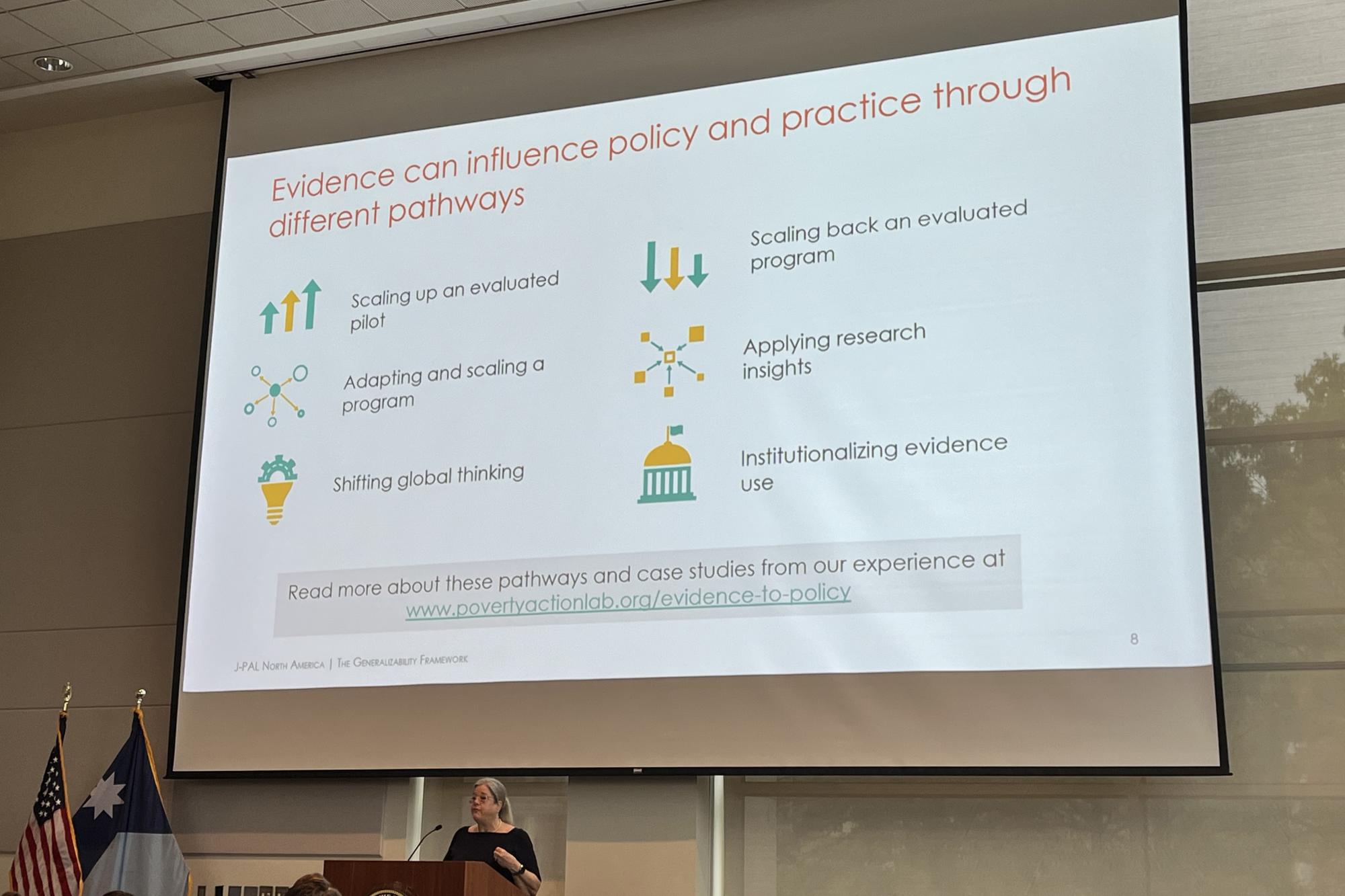
J-PAL North America

Hosted by

Letter from the Co-Executive Directors
2023 marked J-PAL North America’s ten-year anniversary, giving us an opportunity to reflect on a decade of work that catalyzed over 165 studies, impacted over 35 million lives, and shifted over US$500 million in government funds.
In 2024, J-PAL North America turned its attention to the decades ahead. We’re focused on continuing to generate rigorous evidence on how to advance economic mobility and racial equity while expanding our efforts to influence policy. In partnership with governments and practitioners, we will support the scale-up of effective solutions (e.g., tutoring, sectoral employment, cognitive behavioral therapy) to improve many more lives.
While more governments are seeking high-quality research to inform decisions, policymakers continue to face barriers adopting and implementing evidence-based programs at scale. As the playbook of evidence-based programs grows, decision makers need support to identify and adopt proven solutions if we are to fully realize the potential of evidence-based programs to improve lives at scale.
J-PAL North America is leveraging generous funding from Arnold Ventures and other supporters to meet the needs of our partners through new capacity-building, research support, and policy outreach programs. At the same time, we remain committed to answering new, policy-relevant questions, and learning what works to reduce poverty in North America.
We are deeply grateful to our network of researchers, partners, and funders for learning and growing with us, and for their shared commitment to improving lives through evidence-based policymaking.
Laura Feeney, Co-Executive Director
Vincent Quan, Co-Executive Director
J-PAL North America leadership

Amy Finkelstein
Scientific Director

Matthew Notowidigdo
Scientific Director

Laura Feeney
Co-Executive Director

Vincent Quan
Co-Executive Director
J-PAL North America in Review
Generating new research to answer key, policy-relevant questions

J-PAL North America funded 28 new research projects focused on identifying policy solutions in topics including health, housing stability, workforce development, and education. We also expanded our efforts to catalyze research in pressing policy areas such as the criminal legal system, climate action, and racial equity. Our racial equity work this year involved expanding our research network to include racial equity-focused scholars, working with an advisory committee to shape how we study this topic, and launching a Racial Equity RFP.
Through our work with the Learning Engineering Virtual Institute (LEVI), J-PAL North America is supporting seven projects to evaluate ed-tech products that harness the potential of AI to improve learning outcomes. The projects will test a range of interventions, such as algorithms to identify student misconceptions about math and an AI-powered math tutor accessible via WhatsApp.
Our affiliated and invited researchers published over fifteen papers on J-PAL-supported studies. These include research on postpartum primary care engagement, demand for police alternatives, emergency rental assistance, cash transfers, and medical debt relief. These results were featured in news outlets such as The New York Times, The Boston Globe, Vox, Business Insider, and more.
Strengthening partnerships with policymakers and nonprofit leaders
The second year of J-PAL North America’s Leveraging Evaluation and Evidence for Equitable Recovery (LEVER) program provided more opportunities for state and local governments to build knowledge on ways to leverage data, evaluation, and evidence in their decision-making. Through this engagement, J-PAL North America:
- Trained more than 85 state and local jurisdictions on topics related to data and evaluation.
- Supported five partner governments in launching new randomized evaluations in the areas of health, education, infrastructure, and climate.
- Hosted a Virtual Convening with over 65 government leaders representing 33 jurisdictions to discuss evaluation experiences.
We hosted four community of practice sessions with service providers and researchers evaluating the impact of cash transfer programs on homelessness in the San Francisco Bay Area.

Contributing thought leadership through research and policy expertise in the United States
Multiple federal governmental and non-governmental agencies requested input from J-PAL North America on several key policy areas. For example:
- The Federation of American Scientists invited us to submit a policy memo to advise the next presidential administration on how to scale up evidence-based sectoral employment job training programs.
- The National Institute of Corrections requested our input on how to design a new Cognitive Behavioral Therapy program for jails across the country.
- The Department of Housing and Urban Development notified us about a Request for Information on direct rental assistance. In response, we submitted a public comment.
- The White House solicited our insights on a new national violence prevention initiative aiming to address violence across a cohort of cities.
Strengthening policymakers’ capacity to generate and use evidence through customized trainings

In June, we co-facilitated the annual Evaluating Social Programs course with over 40 state and local government partners and other key stakeholders in attendance. The training developed their knowledge of how to implement randomized evaluations in their programs.
Over the summer, we delivered a custom training to state leaders in partnership with Minnesota Management and Budget, laying the groundwork for future rigorous evaluations in Minnesota, and led a custom training for staff at the Department of Housing and Urban Development to support their current and future randomized evaluations.
In December, we led a training in San Diego County to build attendees’ understanding of key evaluation concepts and their applications. The training laid the groundwork for identifying and implementing randomized evaluations to support the County’s Climate Action Plan.
The Year Ahead
- Support state and local governments: A major focus of 2025 and beyond will be supporting state and local governments to adopt evidence-based policies and programs by promoting proven solutions—such as sectoral employment and summer youth employment programs—nationwide.
- Engage government partners through a new offering called Learning Labs: These cohorts of government leaders will seek to identify opportunities to feasibly and ethically embed randomized evaluations into programs and policies. Our first Learning Lab, which will run through the Evidence for Climate Action Project, aims to identify and scale effective and equitable climate mitigation strategies in the United States.
- Launch Economics Pathways: This new flagship program that aims to build the capacity of researchers to conduct high-quality randomized evaluations, while also diversifying and expanding the network of researchers engaged in this work. This program will include a range of mentorship, training, and resource support programs tailored to meet the needs of researchers at varying stages of their careers and experience with randomized evaluations.
- Continue to support research on innovative approaches to novel and pressing policy questions ranging from racial equity and community safety to AI and climate change.
Lead photo credit: Shutterstock.com